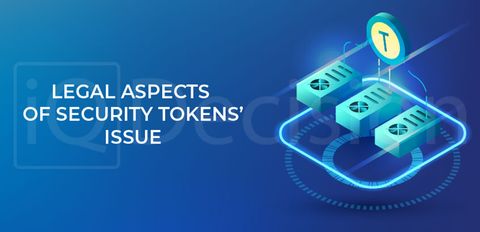The evolution of digital assets began ten years ago with the advent of the Bitcoin cryptocurrency. It was followed by stablecoins - a cryptocurrency that was backed by real assets - and security tokens, i.e. tokens possessing properties of securities. STO is becoming increasingly popular, which is why quite a few entrepreneurs are now considering registering a company for STO in the EU or US.
So, is there any way all those digital currencies can be regulated? The answer is simple: when they’re clearly defined as assets, or when their properties are clearly described in the relevant laws, they can.
So, let’s have a closer look at the legal aspects of issuing security tokens in Asia, Europe & America.
Basic Information About Securities
The main problem with regulating STO in the EU in the US is the use of terminology (i.e. what is meant by securities & financial instruments). The tech sector is now pursuing a results-driven approach, completely ignoring legal aspects. By combining features of certain traditional securities, issuers turn their products tinto payment instruments, thus contributing to the already existing legal confusion.
Registers
Accounting books & registers have pretty much the same purpose - recording information & reflecting transactions. DLT-powered registries can be open, decentralized, distributed, closed, or hybrid. In their turn, traditional registries can also be open or closed, the only difference being that public registers are owned & maintained by government agencies. That, coupled with inspections carried out by government agencies or private companies working for the government, make them more trustworthy & reliable.
DLT technology tries to replicate all ‘good’ features of government-maintained registers, while eliminating the need for an intermediary (which in this case is the government).
Financial Instruments
The laws of many countries are applicable to commercial registries of traders & organizations engaged in trading activities. The register is the main proof of the existence of a legal entity. Any aspect of the company's activities, including issuing shares or obtaining a cryptocurrency exchange license in Singapore, is reflected in the register.
The transfer of shares is also reflected in the company’s register & can be duplicated in the public register as well. The registry can be digital; the authority to maintain it can be delegated through dematerialization, thus, eliminating the need for intermediaries. In the blockchain, assets are owned directly by their owners, providing them with an opportunity to directly interact with other users by using public or private keys.
Tokenization of Digital Assets
From a legal point of view, digital assets are quite difficult to classify. They can be either securities or financial instruments, depending on which law is applicable to them. There’s also a number of general characteristics that can be applied to all digital tokens without exception. And that’s where problems begin to arise. For instance, issuing a tokenized share or bond in Europe may result in the emergence of a completely new type of asset, which is totally independent of any 3rd parties. If you’re planning on launching a cryptocurrency business or registering a cryptocurrency company, you should keep in mind that a token is a record in the blockchain that makes it possible to conduct all kinds of transactions.
The blockchain itself isn’t a registered asset, so it cannot act as a ‘custodian’ of securities. Tokenized securities are held in wallets, thus enabling stocks or bonds to remain in the ledger. Being an asset means that there’s no 3rd party that recognizes this right and in respect of which it can be applied. Transferring funds often requires approval; however, DLT doesn’t work that way. Here, assets can be transferred simply by transferring ownership of the private key associated with a wallet or asset.
Tokenization-Related Issues
In the case of DLT, protection isn’t necessary because the platform is decentralized, which means that no one controls it. It relies on a particular piece of software for its operation. It often happens that the issuer & owner of the software represent two different companies. Things get even more complicated when tokens are issued with reference to another legal entity. All this makes the application of existing laws extremely problematic.
The problem can be resolved if all the above actions are performed by one party. That is, a company must use its own DLT platform for issuing shares and keeping a record of them. In this case, digital tokens are issued and the problem with duplicate ledgers is solved.
Conclusion
In the future, new laws will be required for regulating the issuing, transfering & listing of digital assets in the EU & US. And before that happens, an emphasis should be placed on adapting the current legislation to STO.
If you have any questions regarding launching an STO or obtaining an STO license, IQ Decision UK is always at your service. Our experts will also be happy to provide advice on registering a company for crypto activity or establishing a cryptocurrency exchange in any jurisdiction of your choice.





